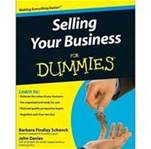Who Should Help You Sell Your Business – Assembling Your Business Sales Team
 Before putting the sale into motion, tap into the expertise you need to construct, negotiate, and steer your sale to a positive end. Work with your accountant, attorney, and broker – all under the protection of confidentiality agreements – instead of relying on people within your business for help. If you must inform key people of the impending sale do so only after your decision to sell is final. Otherwise, you risk causing alarm among your staff and could make them feel vulnerable about their jobs.
Before putting the sale into motion, tap into the expertise you need to construct, negotiate, and steer your sale to a positive end. Work with your accountant, attorney, and broker – all under the protection of confidentiality agreements – instead of relying on people within your business for help. If you must inform key people of the impending sale do so only after your decision to sell is final. Otherwise, you risk causing alarm among your staff and could make them feel vulnerable about their jobs.
Selling your business is not a time for flying solo. Bring in some professionals to assist you in the sale of your business, from accountants to attorneys, business brokers, and appraisers. No matter how small the deal is no one should sell a business without obtaining financial and tax advice.
An accountant is probably the first team member you will recruit because they will have the information at hand to help you prepare the numbers you need to plan your sale offering and present your business to buyers.
An attorney can advise on issues regarding business structure, employees, contracts and other legal matters. An attorney can help prepare legal documents and sale agreements to finalize the sale.
A business broker sometimes called a mergers and acquisition specialist can free you from the demands of selling your business while running it. A broker can provide advice on how to value a business for sale and help maintain confidentiality while finding prospective buyers.
An appraiser can provide a formal document to prove validity of the business value to the buyer or to the IRS. A business broker or advisor can also give their opinion of value but if you want a formal document, hire a professional appraiser.
How to decide where you need help
Ask yourself the following questions in order to determine if you need to seek professional resources to aid in the sale of your business.
- Do you know what your business is worth? What your assets worth and what are they for example cars, office equipment and are they easy to value. Does your business involve harder-to-assess assets such as major equipment, inventory, brand value or reputation, proprietary processes, goodwill, and intellectual property including patents, trademarks, and copyrighted material?
- Do you know who and where your likely buyers are? Some business sales start with a willing and able buyer but for most sellers finding a buyer is a looming issue. Do you have a clear picture of the kind of person who will buy your business? Will your prospective buyer be shopping for a business like yours or shopping for a business period?
- Do you have time to simultaneously run your business and prepare it for sale? The last thing you would want is your business to suffer from neglect while you direct your energy to the effort of selling it. If selling your business distracts you from running your business and if you do not have a dependable employee to take up the slack while you turn your attention to the sale then get help from a broker. If running your business and serving customers already consumes most of your working hours then you will probably need sale assistance. Can you redirect your efforts to marketing your business while keeping your sale plans confidential? Would your business suffer if word leaked out to customers, suppliers, or distributors? Using a business broker can give you a valuable layer of protection and confidentiality.
- Are you good at marketing, presenting, and negotiating? For the same reason you would hire bookkeeping assistance if you were weak on the numbers front, you want to hire a business broker if you are not the best person to design and implement a business for sale marketing plan.
** from the book Sell a Business for Dummies by Barbara Findlay Schenck, Business Advisor & Sunbelt’s CEO John Davies
Who Should NOT Help You Sell Your Business
Do your research and check out firms before trusting them to sell your company or give you advice. At Sunbelt Business Advisors our fees are success-based, meaning our brokers are paid when the seller is paid – at the closing table. Use caution with any firm that asks for upfront or commitment fees. Ask these questions when deciding on whom to have on your business sales team.
- Do you have a list of recent successful transactions and references?
- How much of your income is from selling companies versus selling business valuations?
- How are you going to market the business for sale? Does the company have dedicated staff that will do outbound calling or an internet marketing strategy?
- Does the company have an analyst who will create a target list of strategic buyers?
Deciding which professional resources to call upon ultimately depends on the nature and size of your business, your personal abilities, and interests and on the amount of spare time in your calendar. Before deciding to sell think about assembling a business sales team, who you can trust, to help maximize the sale of your business.




